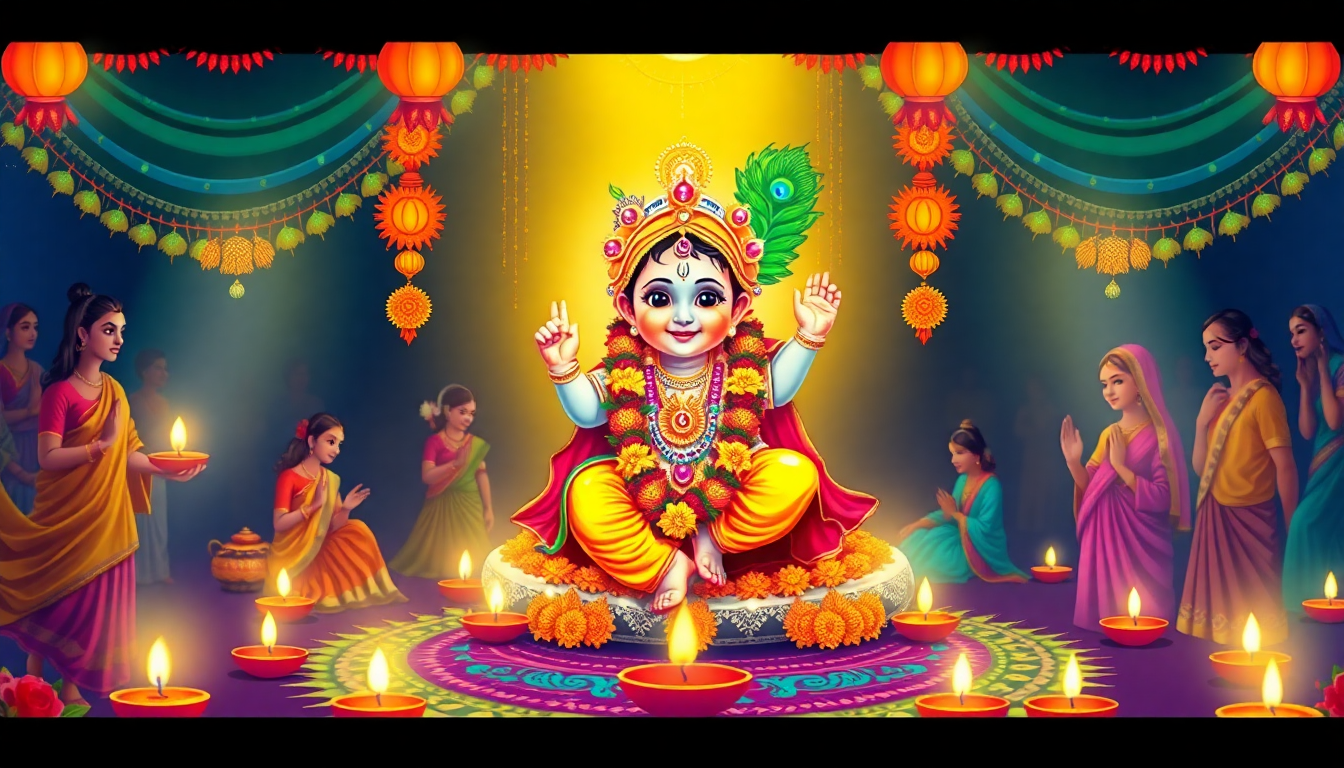The Complete Guide: How to Celebrate Krishna Janmashtami with Joy and Devotion
Krishna Janmashtami, the auspicious festival commemorating the birth of Lord Krishna, is a time-honored celebration that holds immense spiritual and cultural significance for millions of devotees across the world. This joyous occasion invites us to immerse ourselves in the divine love, wisdom, and playful spirit of the beloved avatar of Lord Vishnu.
Understanding the Legend of Lord Krishna
The birth of Lord Krishna is a captivating story that has been passed down through generations, inspiring devotion and reverence in the hearts of believers. According to Hindu mythology, Krishna was born to Devaki and Vasudeva in the city of Mathura, during a time of great turmoil and oppression under the tyrannical rule of Kamsa, Devaki's brother.
The symbolic meaning of Krishna's birth transcends the physical realm, representing the eternal triumph of good over evil, the descent of the divine into the material world, and the manifestation of God's infinite love and compassion for his devotees. Through his enchanting pastimes, Krishna exemplifies the principles of dharma, devotion, and the pursuit of spiritual enlightenment.
Spiritual Preparations for Janmashtami
As the auspicious day of Krishna Janmashtami approaches, devotees engage in various spiritual practices to prepare their hearts and minds for the celebration. This process of inner transformation involves mental and emotional readiness, adherence to fasting guidelines, and the cultivation of a deep connection with the divine through prayer and meditation.
Fasting, a common practice during Janmashtami, is not merely a physical act of abstinence, but a means of purifying the body and mind, allowing devotees to focus their attention on the divine. The guidelines for fasting may vary across regions, but the underlying principle remains the same: to cultivate a state of heightened spiritual awareness and devotion.
Through the practice of prayer and meditation, devotees seek to align their consciousness with the infinite love and wisdom of Lord Krishna. This profound connection is often expressed through the chanting of sacred mantras, the recitation of devotional hymns, and the contemplation of Krishna's divine attributes and pastimes.
Traditional Celebration Practices
The celebration of Krishna Janmashtami is marked by a rich tapestry of traditional practices that have been passed down through generations. At the heart of these celebrations is the meticulous decoration of the home, with intricate rangoli designs, colorful flowers, and the placement of the Krishna idol in a beautifully adorned altar.
The ritual worship of the Krishna murti, or idol, is a central aspect of the Janmashtami celebrations. Devotees engage in elaborate puja ceremonies, offering prayers, flowers, incense, and various auspicious items to honor the divine presence of Lord Krishna. The midnight hour, believed to be the time of Krishna's birth, is particularly revered, with devotees gathering to witness the reenactment of the birth narrative and to offer their heartfelt devotions.
Regional variations in the celebration of Janmashtami add to the cultural richness of this festival. From the swing festivals of Mathura and Vrindavan to the unique customs of South India, each community brings its own distinct flavor to the celebrations, reflecting the diverse tapestry of Hindu traditions.
Devotional Activities
The celebration of Krishna Janmashtami is a time of deep spiritual immersion, where devotees engage in a variety of devotional activities to honor the divine. The air is filled with the melodious chanting of bhajans and kirtans, as devotees come together to sing praises of Lord Krishna and to express their love and devotion.
The reading of sacred texts, such as the Bhagavad Gita and the Bhagavata Purana, is another integral part of the Janmashtami celebrations. Devotees gather to listen to the recitation of these timeless scriptures, which offer profound insights into the nature of the divine and the path of spiritual enlightenment.
Community gatherings and festivals further enhance the celebratory spirit of Janmashtami, as devotees come together to share in the joy of the occasion, participate in cultural programs, and engage in collective acts of devotion.
Special Food and Offerings
The celebration of Krishna Janmashtami is also marked by the preparation of traditional and auspicious food offerings. Devotees meticulously craft a variety of prasad, or sacred offerings, that are presented to the Krishna idol and later shared among the community.
These prasad dishes often hold deep symbolic meaning, with each ingredient and preparation method imbued with spiritual significance. From the delectable sweets like laddus and pedas to the savory delicacies like kachori and samosas, the Janmashtami feast is a true feast for the senses and the soul.
For those observing fasts during the festival, special food preparations are made to sustain the body and nourish the spirit. These fasting-friendly dishes, such as vrat ki sabzi and sabudana khichdi, are not only delicious but also serve as a means of honoring the divine and maintaining a state of spiritual purity.
Cultural and Family Traditions
The celebration of Krishna Janmashtami is deeply rooted in the cultural and familial traditions of Hindu communities. Across generations, families gather to share in the joy of the occasion, passing down the rich tapestry of customs and rituals that have been cherished for centuries.
The family gathering during Janmashtami is a time of profound connection, where elders impart the stories and legends of Lord Krishna to the younger generations. Through the art of storytelling, the cultural heritage is preserved, and the devotional spirit is ignited in the hearts of the youth.
These family traditions often extend beyond the confines of the home, as communities come together to celebrate the festival with shared customs and collective celebrations. The sense of unity and belonging that permeates these gatherings is a testament to the enduring power of the Krishna Janmashtami celebration.
Modern Interpretations and Celebrations
As the world evolves, the celebration of Krishna Janmashtami has also adapted to the changing times, embracing modern interpretations and expressions of devotion. While the core spiritual essence remains unchanged, the festival has seen a surge of innovative and engaging ways for devotees to connect with the divine.
In the digital age, the celebration of Janmashtami has found new avenues for expression, with devotees sharing their experiences, insights, and devotional content through various online platforms. This has not only expanded the reach of the festival but has also fostered a global community of Krishna devotees, transcending geographical boundaries.
The involvement of the younger generation in the Janmashtami celebrations is another remarkable aspect of the modern interpretation. From the organization of cultural programs and community events to the incorporation of technology-driven elements, the youth are actively shaping the future of this timeless festival, ensuring its continued relevance and vibrancy.
Conclusion
The celebration of Krishna Janmashtami is a profound and multifaceted experience that invites us to immerse ourselves in the divine love, wisdom, and playful spirit of Lord Krishna. Through the rich tapestry of spiritual practices, traditional customs, and cultural heritage, this festival serves as a powerful reminder of the eternal connection between the divine and the human.
As we embark on the journey of Janmashtami, may our hearts be filled with joy, our minds be imbued with devotion, and our souls be uplifted by the timeless teachings of the beloved Lord Krishna. Let us embrace this auspicious occasion as a catalyst for personal transformation, community unity, and the cultivation of a deeper understanding of the divine within and without.



